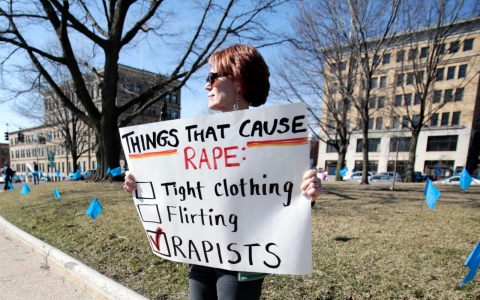Sexual Abuse on Campus

A national debate on how to handle the problem of campus sexual abuse continued throughout 2014
Before the November 2014 Rolling Stone feature about a brutal assault at the University of Virginia (UVA) received national attention, student activists were already making an impact by speaking out about sexual abuse. Activists on college campuses, such as Columbia University student Emma Sulkowicz, brought the issue of sexual abuse into the national conversation like never before. In 2014, Sulkowicz became internationally known for carrying her mattress around campus until the man accused of assaulting her was expelled from the university. However, when doubts and inconsistencies of the Rolling Stone story surfaced, many feared that it would make it harder than ever for victims to come forward, and for any true progress to be made. Obama Administration EffortsThe United States Department of Education sent a letter in 2011 to all U.S. college and university presidents. The letter explained that Title IX required all schools to investigate cases of sexual assault on their campuses. The letter also stated that schools must adjudicate these cases and hold the accused responsible if there was at least a 50.1% chance that the assault had occurred. In 2014, President Barack Obama created the White House Task Force to Protect Students from Sexual Assault. The task force published a report that also included the same Title IX requirements as well as proposals on how to prevent and respond to sexual assault on campus, such as bystander intervention programs. Soon after the task force released its report, the U.S. Department of Education came forward with a list of colleges and universities that were under federal investigation for mishandling rape cases and, therefore, in violation of Title IX. As of December 15, 2014, 90 colleges and universities were under investigation. Others Weigh InThe Foundation for Individual Rights in Education and the American Association of University Professors both publicly opposed the letter that the Department of Education sent out in 2011. The Obama administration's support of campus hearings has also been criticized. The Rape, Abuse & Incest National Network (RAINN) wrote a letter to the White House criticizing its stance on campus hearings. In the letter, RAINN stated that campus hearings could not handle the crime of rape because "they lack protections for the accused while often tormenting victims." Other critics have said that these campus hearings do not taking into consideration false allegations and wrongful convictions which lead to innocent students being expelled. A number of male students have filed lawsuits against colleges and universities for being expelled for assaults that they say they did not commit and, therefore, their Title IX rights have been violated. The National Center for Higher Education Risk Management (NCHERM) also weighed in during 2014, issuing an open letter to all parties involved in the issue. While NCHERM's letter supported the Department of Education's stance, it encouraged colleges and universities to allow students to have legal representation during campus hearings. The NCHREM letter noted the Family Educational Rights and Privacy Act of 1974, which due to confidentiality obligations, means that a school cannot set the record straight should it be inaccurately depicted in the media for letting an accuser off in one of these cases. Rolling Stone DebacleIn November 2014, a Rolling Stone story, "A Rape on Campus: A Brutal Assault and Struggle for Justice at UVA," was published and received a lot of national attention. First, it got noticed because of how brutal the story was. Then other journalists and news outlets questioned the story's credibility. Those questions and doubts led to an apology from Rolling Stone, which said that it shouldn't have agreed to the victim's request not to contact the alleged assailants to get their side of the story. The magazine had agreed to not contact them out of sensitivity to the victim. "We apologize to anyone who was affected by the story and we will continue to investigate the events of that evening," wrote Will Dana, the magazine's managing editor, in the apology. In March 2015, Charlottesville police investigators announced that they found "no substantive" evidence in the UVA fraternity gang rape case that was reported on by Rolling Stone. After around 70 interviews and a four-month review, police found "no evidence" that a party took place on Sept. 28, 2012, at the Phi Kappa Psi house where a woman identified in the Rolling Stone feature as Jackie said the rape occurred. Jackie refused to cooperate with the Charlottesville police investigation. Many feared that the outcome of the investigation would make it even more difficult for victims of rape to come forward. Another investigation into the UVA case, led by the Columbia University Graduate School of Journalism, was released on April 5, 2015. Commissioned by Rolling Stone, Columbia's report pointed to the magazine's many failures in the reporting and editing of the article, including not verifying Jackie's story with three of her friends and not going to the fraternity with the accusations before the article was published. On the same day that Columbia released its report, Rolling Stone said that it was retracting the story. The following day, Phi Kappa Psi, the UVA fraternity involved in the retracted story announced that it planned to sue the magazine for reckless reporting and for hurting the fraternity's reputation. The issue of sexual abuse at colleges and universities came to the forefront of the national spotlight in 2014. The Obama administration created a task force to raise awareness. At least 90 colleges and universities were under investigation for how they've handled the issue. Even though Rolling Stone mishandled their cover story on campus rape, it brought even more attention to a subject that needs to be addressed at every college and university in the United States. Source: U.S. Department of Education, Rape, Abuse & Incest National Network, National Center for Higher Education Risk Management |
—Jennie Wood








